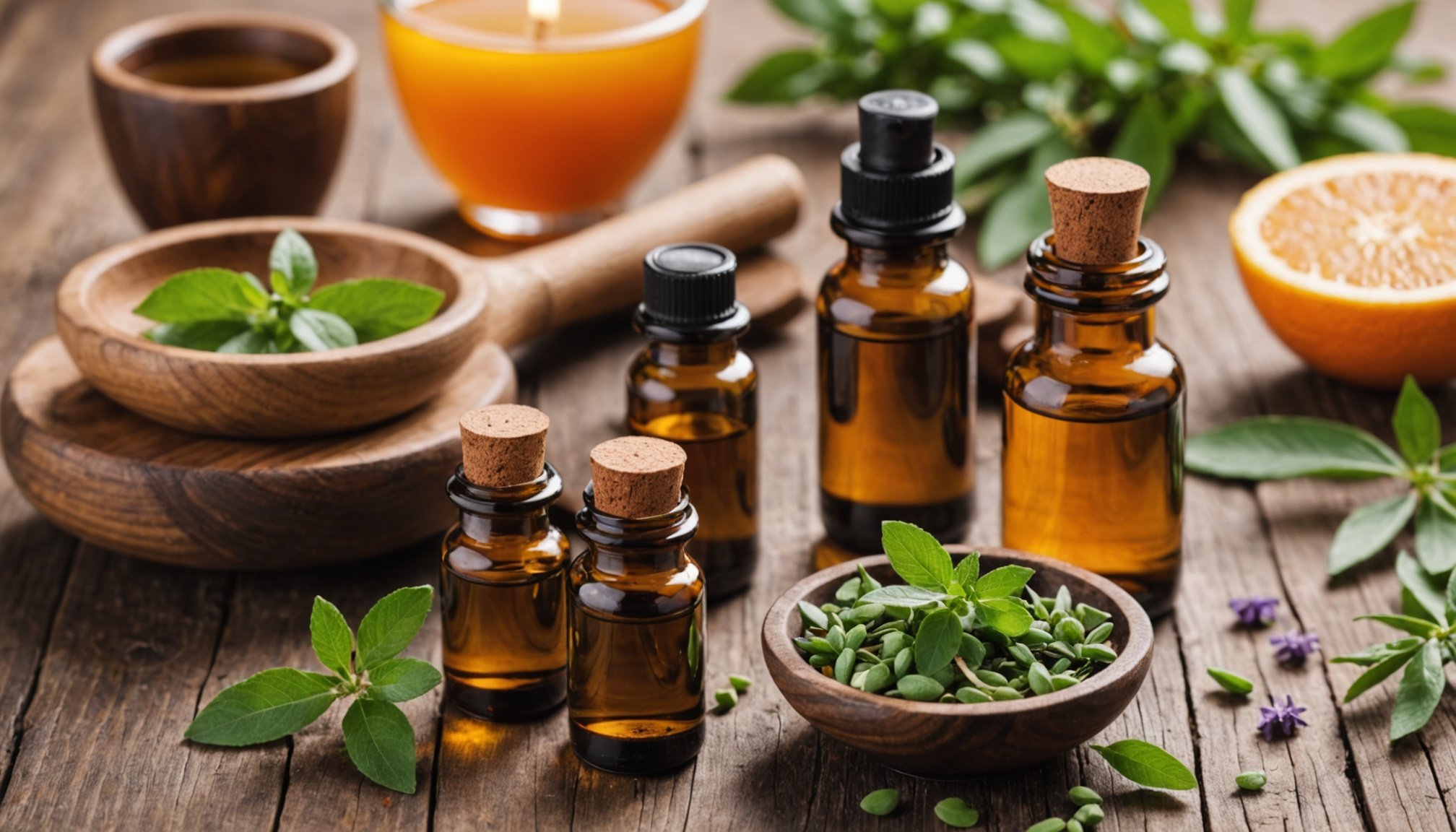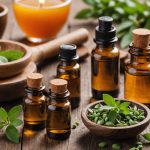Understanding Aromatherapy and Its Principles
Aromatherapy is a holistic healing treatment that uses natural plant extracts, often referred to as essential oils, to promote health and well-being. Rooted in ancient practices, this age-old tradition has been utilized across various cultures for thousands of years to address both physical and emotional concerns.
At the heart of aromatherapy are the aromatherapy basics, which involve understanding how essential oils work. These concentrated extracts interact with our brain in remarkable ways, primarily through inhalation. When inhaled, the molecules in essential oils travel through the nasal passages to the olfactory system, a pivotal part of the sensory system responsible for the sense of smell.
Have you seen this : Unlocking the Power of Cold Showers: Transforming Mental and Physical Health
The olfactory system is directly linked to the limbic system, an area of the brain that regulates emotions and mood. This connection highlights how essential oils can significantly influence mood enhancement. For instance, specific scents like lavender or chamomile are widely regarded for their calming effects, while citrus oils are known to invigorate and uplift.
Incorporating aromatherapy basics into daily life can lead to positive changes in emotional well-being. By selecting appropriate essential oils, users can harness the power of scent to support relaxation, boost energy, and enhance their mood naturally.
Also to discover : Discover stylish orthopedic shoes for women's comfort today
Essential Oils That Boost Mood
When it comes to uplifting essential oils, few compare to their mood-lifting properties. These oils are renowned for enhancing mental well-being and can be a perfect addition to your daily routine for a happier, more balanced life.
Lavender Oil
Lavender oil is celebrated for its profound benefits in promoting relaxation and easing stress. Scientific studies have consistently demonstrated its effectiveness, showing that its soothing properties can reduce anxiety levels and improve sleep quality. Many individuals share personal testimonials on how incorporating lavender oil into their daily routines, such as adding a few drops to a diffuser or a warm bath, has positively impacted their stress relief efforts.
Citrus Oils
Engaging with citrus oils, like lemon and orange, can deliver a zestful boost to your day by improving mental clarity and providing energizing effects. These particular oils are often chosen for their ability to invigorate and refresh the senses. Users commonly report that citrus aromatherapy can brighten their mood and foster a sense of alertness, making it a popular choice for morning routines.
Peppermint Oil
Peppermint oil is esteemed for its impact on enhancing mental alertness and focus. There is significant evidence supporting its invigorating properties. To use peppermint essential oil effectively, try applying a few drops to your temples or diffusing it in your workspace to promote a sense of vitality and concentration.
Methods of Application
Essential oil use encompasses a variety of aromatherapy techniques that cater to different personal preferences and therapeutic needs. Understanding these methods can enhance your experience and benefits from essential oils.
A popular application method is diffusion, which disperses essential oils into the air, allowing for inhalation. This is often achieved using essential oil diffusers, which gently release the oil’s aromatic compounds into the atmosphere. This method is widely considered effective for promoting relaxation and purifying air spaces.
Alternatively, direct inhalation from a bottle or with a steam bowl can provide a more potent experience. This technique is beneficial for immediate relief from stress or congestion, as the aromatic compounds are rapidly absorbed through the respiratory system.
Topical application involves placing diluted essential oils directly onto the skin. It’s crucial to adhere to safety guidelines here, as undiluted oils can cause irritation. Always blend oils with a carrier substance, such as coconut or jojoba oil, to prevent adverse reactions.
Best practices for aromatherapy recommend tailoring application methods to specific needs, mindfulness toward personal sensitivities, and selecting quality oils from reputable sources to maximize benefits safely and effectively.
Psychological Benefits of Aromatherapy
Aromatherapy, using plant extracts to enhance well-being, has shown notable potential in mental health benefits. One primary area of impact is stress reduction, where studies indicate aromatherapy can significantly relieve symptoms associated with anxiety and depression. The scents from essential oils such as lavender and chamomile are known to trigger activity in the brain’s limbic system. This system influences emotion regulation and can lead to a calmer state.
Research supports the efficacy of aromatherapy in emotional wellness. A 2018 study found participants exposed to aromatherapy reported reduced feelings of depression compared to those who weren’t. These findings suggest an association between essential oils and mood enhancement. Psychology professionals point out that aromatherapy could serve as a supplementary treatment to traditional mental health therapies, providing individuals with non-invasive methods to enhance well-being.
Furthermore, whilst not a replacement for conventional treatments, aromatherapy offers an accessible option for those seeking to manage mood disorders. By incorporating essential oils into daily routines, individuals can experience subtle mood shifts. It’s essential, however, for individuals to consult medical professionals when considering aromatherapy for mental health concerns. Empowering oneself with knowledge can lead to a positive exploration of aromatherapy’s benefits.
Incorporating Aromatherapy into Daily Life
Incorporating aromatherapy into your daily routine can be quite seamless with a few practical tips. Start by selecting essential oils that you enjoy or that cater to your needs, such as lavender for relaxation or peppermint for energy.
One simple method is to use a diffuser in your home or office, allowing the essential oils to permeate the air consistently throughout the day. You can also incorporate essential oils into your stress management routine by adding a few drops to your bath, using them in massage oils, or even placing them on your pillow for a restful night’s sleep.
During particularly stressful times, consider carrying a small roller bottle of your favourite blend, applying it to your pulse points when you feel tension building.
Successful Aromatherapy Experiences
Incorporating aromatherapy can yield substantial benefits. For instance, a case study highlighted a professional who successfully included aromatherapy in her daily routine by setting up a morning ritual with a citrus diffuser to boost her mood. Another individual found relief from evening stress by using a chamomile-infused bath as part of her winding-down process. These examples demonstrate the potential effectiveness of integrating aromatherapy into everyday activities for improved stress management.
Expert Opinions and Research
Understanding aromatherapy’s credibility involves examining both expert testimonials and scientific research. Recent studies have delved into the effects of aromatherapy on mood, revealing noteworthy insights. For instance, research indicates that certain essential oils may influence emotions, offering calming or uplifting effects. This connection between scents and mood underpins the scientific basis for aromatherapy’s perceived benefits.
Expert testimonials also highlight the practicality and efficacy of aromatherapy. Practitioners often share personal experiences demonstrating how essential oils have provided relief for stress or anxiety in their clients. These real-world applications reinforce the importance of proper practices and knowledgeable guidance when using aromatherapy.
The role of credible sources cannot be overstated in this domain. Trustworthy research and authentic testimonials help distinguish fact from speculation, thereby preventing misinformation. By relying on well-conducted scientific studies and expert insights, individuals can make more informed decisions about using aromatherapy.
Ensuring the validity of aromatherapy as a practice hinges on informed decisions backed by authentic research and expertise. With a growing body of studies and expert insights, understanding of aromatherapy continues to evolve, enriching its potential benefits for those seeking mood enhancement through natural means.











